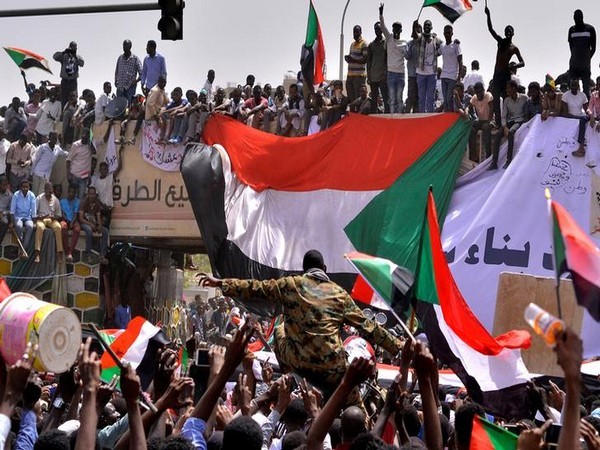Regional powers, leading players trying to shore up positions in Sudan

- Country:
- Sudan
The Sudanese military's bloody crackdown on a pro-democracy protest camp in Khartoum this week was a major blow to efforts to create a democracy following the overthrow of President Omar Hassan al-Bashir on April 11. The head of Sudan's ruling military council, Lieutenant General Abdel Fattah al-Burhan, offered on Wednesday to resume talks on the transfer of power to civilians, as the number of people killed since security forces stormed the sit-in climbed to 60.
Here are some leading players and regional powers that are trying to shore up their positions in Sudan, which is trying to rebuild after rebellions and economic crises, and policies that turned it into a pariah state under Bashir.
GENERAL MOHAMED HAMDAN DAGALO
The deputy head of the Transitional Military Council (TMC), is arguably the most powerful man in Sudan. Dagalo, known as Hemedti, commands the Rapid Support Forces (RSF), a widely feared paramilitary group said to number in the tens of thousands that stand accused of genocide in the Darfur war. Bashir's government denied the allegations. Witnesses said the RSF, which controls Khartoum, led the crackdown on the protest camp. Their deployment suggests Hemedti, a former Darfur fighter with a fearsome reputation, is calling the shots, at least when it comes to security.
He also derives power from his ties to the UAE and Saudi Arabia. His RSF forces helped the oil-rich Gulf Arab countries in Yemen's civil war. Hemedti is a high-profile figure, delivering public speeches and meeting Western diplomats.
ABDEL FATTAH AL-BURHAN
Burhan, who heads the Transitional Military Council (TMC), was the inspector general of the Sudanese armed forces and its third most senior general. Unlike Hemedti, he is little known in public life. He was the head of Sudan's ground forces, a role in which he oversaw Sudanese troops who fought in the Saudi-led Yemen war. He has close ties to senior Gulf military officials as he was responsible for coordinating Sudan's military involvement in the war.
Sudanese PROFESSIONALS ASSOCIATION
The Sudanese Professionals Association (SPA), which spearheaded the rallies that helped topple Bashir, now leads a broad coalition of opposition groups seeking a transfer of power to civilians. It is made up of unionists and activists and includes lawyers, engineers and doctors.
The protesters, which sometimes swelled to hundreds of thousands at the sit-in, come from all walks of life: accountants, tea-sellers, lawyers, students, artists and designers. Women were a driving force behind the protests outside the defence ministry.
UNITED ARAB EMIRATES
The UAE has become increasingly powerful in the Middle East, with its policies driven mostly by Abu Dhabi Crown Prince Mohamed bin Zayed al-Nahyan. He has praised Sudan for helping in the Yemen war but his interests in the African country go far beyond Yemen's battlefields. Prince Mohammed, along with Saudi Arabia and Egypt, has been spearheading efforts to combat political Islam, which they see as an existential threat to their countries and the region. All three countries support Sudan's new rulers and hope to consolidate influence in the country.
Their main priority is to stamp out the influence of Islamists, who have dominated the country since Bashir seized power in a bloodless coup in 1989. The UAE and Saudi Arabia between them pledged $3 billion in financial and material support to Sudan in late April, just after the coup. Burhan visited the UAE in late May on the heels of a trip to Egypt and a visit by Hemedti to Saudi Arabia.
EGYPT
For Egyptian President Abdel Fattah al-Sisi, the protests in Sudan may be too close for comfort. They are a potent reminder of the Arab Spring uprisings which toppled President Hosni Mubarak but ultimately delivered very little freedom.
The Egyptian military effectively ousted Mubarak after it was clear that protests were spiralling out of control. In 2013, then army chief Sisi toppled Mohamed Mursi of the Muslim Brotherhood, Egypt's first democratically elected leader, after mass protests. Sisi was later elected president. He outlawed the Brotherhood and cracked down on dissent. Like his Gulf allies, Sisi would like to see the Islamists entrenched in Sudan's army, intelligence and other key positions replaced with moderates.
SAUDI ARABIA
The Gulf oil power, along with Egypt and the UAE, is engaged in a struggle for influence against Qatar and Turkey, which they accuse of trying to spread radical Islam in the Middle East. The Gulf states and Cairo want to make certain that their regional rivals can't capitalize on Sudan's uncertainty and they see the TMC as the safest bet, at least for now. Like Egypt, the Gulf powers fear that any repeat of the 2011 uprisings could threaten their hold on power.
(With inputs from agencies.)
- READ MORE ON:
- Military recruitment
- Military academy
- Military service
- The Fighter
- Fighter pilot
- The King of Fighters
- University of Khartoum
- Khartoum International Airport
- Port Sudan
- Abdel Fattah alBurhan
- MOHAMED HAMDAN DAGALO
- Omar Hassan alBashir
- Rapid Support Forces
- military
- fighter
- players
- protest camp
- Transitional Military Council
- Khartoum
ALSO READ
US military says destroyed missile launched from Houthi-controlled areas of Yemen
US, Japan, and South Korea conduct joint military exercises in contested waters during Biden's meetings with Japanese and Philippine leaders
Israel reports attempted terror attack at military post
US, Japan, and South Korea Conduct Joint Military Exercises in Contested Waters While President Biden Meets with Leaders of Japan and the Philippines
Russian military says it shot down five Ukrainian drones overnight










